Naturally Leavened Pizza Dough (No Yeast)
Naturally leavened pizza dough is a great way to make delicious and flavorful pizza without the use of commercial yeast. The process is simple and only requires water, flour, salt and sourdough starter. The dough is proofed overnight in the fridge which helps to intensify the flavor. The dough yields two puffy and airy Neapolitan-style pizza crusts. Top it with tomato sauce, buffalo mozzarella and fresh basil for a classic pizza Margherita or add cured meats such as salami, prosciutto, or mortadella for a more indulgent topping.

Ingredients and Tools You’ll Need

Step-by-Step Instructions
Step 1
Make the leaven: In the morning, refresh your sourdough starter with lukewarm water and flour. Mix and knead briefly until there are no dry patches of flour left. Let it rest in a warm spot (ca. 28° C) for around 4 – 6 hours, or until it has doubled in size and looks bubbly.
Step 2
Make the main dough: Dissolve the active leaven in the water. Add the flour and mix briefly until a shaggy dough forms. Cover it with plastic wrap or a damp tea towel and let it rest on the counter for about 30 minutes. Mix in the salt and knead the dough for about 5 minutes until it feels smooth and elastic.
Step 3
Bulk fermentation: Transfer the dough to a lightly oiled proofing container. Cover it with plastic wrap or a damp tea towel and let it rise in a warm spot (around 28 °C) for about 4 hours until it has significantly increased in size. By the end of the bulk fermentation, the dough should have grown at least 50% of its original volume. You should see lots of bubbles throughout the dough and on the surface. If it still looks dense, it needs more time to rise. The warmer your environment, the faster it will rise.
Step 4
Shape pizza dough balls: Divide the dough into two equally sized portions. Fold the corners of each dough piece into the center, overlapping each other. Do this several times until you end up with a tight, rounded shape. Flip the dough over (with the seam side down). Using both hands, pull the dough towards you in a circular motion until it has a smooth surface and holds its shape easily. Avoid using too much flour on your work surface while shaping the dough balls. The dough should lightly stick to the counter to create surface tension. Place the dough balls back into a lightly oiled proofing container. Cover and transfer it to the fridge to proof overnight, or for up to 48 hours.
Step 5
Pre-heat the oven and make the tomato sauce: Pre-heat your oven to the highest heat setting, ideally with a pizza stone or baking steel inside. If you use a pizza oven, make sure it reaches 400 – 450° C before loading the pizza. While the oven is pre-heating, prepare the tomato sauce. Add the canned tomatoes, salt and olive oil to a small mixing bowl. Tear the basil leaves into small pieces with your fingers and add them to the bowl. Use a fork to break up the tomatoes or crush them with your hands. Mix well to combine.
Step 6
Stretch the dough out and add toppings: Take the dough out of the fridge about 1-2 hours before making the pizza. It should have room temperature before stretching it out. Once your oven has reached the desired temperature, place the dough balls on a floured work surface and gently flatten them into discs with the palm of your hands. Then, use your fingertips to press the air from the center of the dough outwards, but don’t deflate the outer edge of the crust. Leave a rim of about 1-2 cm. This creates a nice and puffy crust. Gently slide the backs of your hands underneath the dough and lift it up to stretch it out to the desired thickness. Be careful to not tear it. Transfer the dough to a pizza peel or baking tray. Spread the tomato sauce on top and add toppings of your choice.
Step 7
Bake the pizza:
In a pizza oven: Bake the pizza for around 1-2 minutes, or until the crust looks puffed up and is browned to your liking.
In a conventional oven: Bake the pizza at 230° C (or as high as your oven can go) for about 8 – 12 minutes until the crust is nicely browned. If you have a broiler element, you can turn it on during the last couple of minutes for extra browning and crispness.
Sample Baking Schedule
Day 1
Day 2

More Sourdough Recipes You May Like:

Naturally Leavened Pizza Dough (No Yeast)
Equipment
- Digital kitchen scale – for best results, always weigh your ingredients. It's more accurate than measuring by volume,
- Glass bowl or baking dish – to proof the dough.
- Tea towel or plastic wrap – to cover the dough while resting.
Ingredients
For the leaven:
- 30 g Sourdough starter
- 30 g Water – lukewarm around 30 °C
- 60 g Wheat flour – All-purpose or bread flour
For the main dough:
- 100 g Leaven
- 210 g Water – lukewarm around 30°C
- 300 g Flour – "Tipo 00" or bread flour with a protein content of 12%
- 8 g Salt – fine grain sea salt
- Semolina flour – to dust the work surface
For the tomato sauce and toppings:
- 400 g Can of whole peeled tomatoes – ideally, San Marzano
- 4 g Salt – about a teaspoon of fine sea salt
- 5-10 Fresh basil leaves
- 1 tbsp Extra Virgin Olive Oil – plus extra to drizzle over the pizza
- Toppings of your choice – e.g: buffalo mozzarella, freshly grated parmesan cheese, salami, prosciutto, mortadella…
Instructions
- Make the leaven: In the morning, refresh your sourdough starter with lukewarm water and flour. Mix and knead briefly until there are no dry patches of flour left. Let it rest in a warm spot (ca. 28° C) for around 4 -6 hours, or until it has doubled in size and looks bubbly.
- Make the main dough: Dissolve the starter in the water. Add the flour and mix briefly until a shaggy dough forms. Cover it with plastic wrap or a damp tea towel and let it rest in on the counter for about 30 minutes. Mix in the salt and knead the dough for about 5 minutes until it feels smooth and elastic.
- Bulk fermentation: Transfer the dough to a lightly oiled proofing container. Cover it with plastic wrap or a damp tea towel and let it rise in a warm spot (around 28 °C) for about 4 hours until it has significantly increased in size. By the end of the bulk fermentation, the dough should have grown at least 50% of its original volume. You should see lots of bubbles throughout the dough and on the surface. If it still looks dense, it needs more time to rise. The warmer your environment, the faster it will rise.
- Shape pizza dough balls: Divide the dough into two equally sized portions. Fold the corners of each dough piece into the center, overlapping each other. Do this several times until you end up with a tight, rounded shape. Flip the dough over (with the seam side down). Using both hands, pull the dough towards you in a circular motion until it has a smooth surface and holds its shape. Avoid using too much flour on your work surface while shaping the dough balls. The dough should lightly stick to the counter to create surface tension. Place the dough balls back into a lightly oiled proofing container. Cover and transfer it to the fridge to proof overnight, or for up to 48 hours.
- Pre-heat the oven and make the tomato sauce: Pre-heat your oven to the highest heat setting, ideally with a pizza stone or baking steel inside. If you use a pizza oven, make sure it reaches 400 – 450° C before loading the pizza. While the oven is pre-heating, prepare the tomato sauce. Add the canned tomatoes, salt and olive oil to a small mixing bowl. Tear the basil leaves into small pieces with your fingers and add them to the bowl. Use a fork to break up the tomatoes or crush them with your hands. Mix well to combine.
- Stretch the dough out and add toppings: Take the dough out of the fridge about 1-2 hours before making the pizza. It should have room temperature before stretching it out. Once your oven has reached the desired temperature, place the dough balls out on a floured work surface and gently flatten them into discs with the palm of your hand. Then, use your fingertips to press the air from the center of the dough outwards, but don’t deflate the outer edge of the crust. Leave a rim of about 1-2 cm. This creates a nice and puffy crust. Gently slide the backs of your hands underneath the dough and lift it up to stretch it out to the desired thickness. Be careful to not tear it. Transfer the crust to a pizza peel or baking tray. Spread the tomato sauce on top and add toppings of your choice.
- Bake the pizza: In a pizza oven: Bake the pizza for around 1-2 minutes, rotating it occasionally, until the crust looks puffed up and browned to your liking. In a conventional oven: Cook the pizza at 230° C (or as high as your oven can go) for about 8 – 12 minutes until the crust is nicely browned. If you have a broiler element you can turn it on during the last couple of minutes for extra browning and crispness.
Video
Nutrition
Do you have any questions about this recipe?
Let me know in the comments!



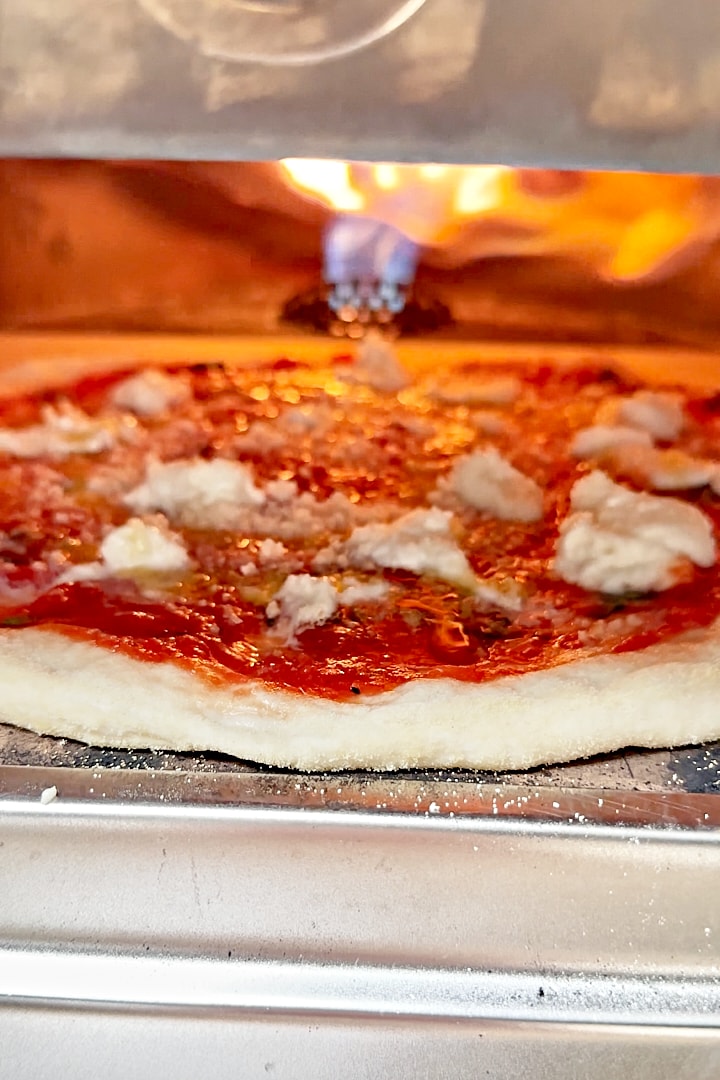

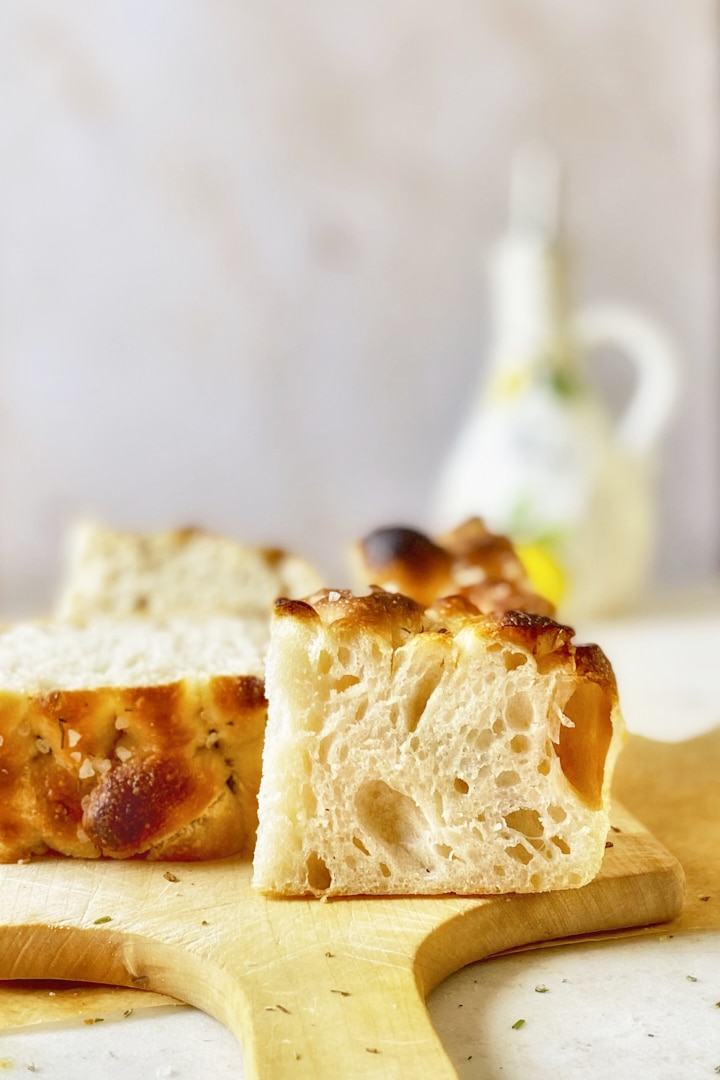
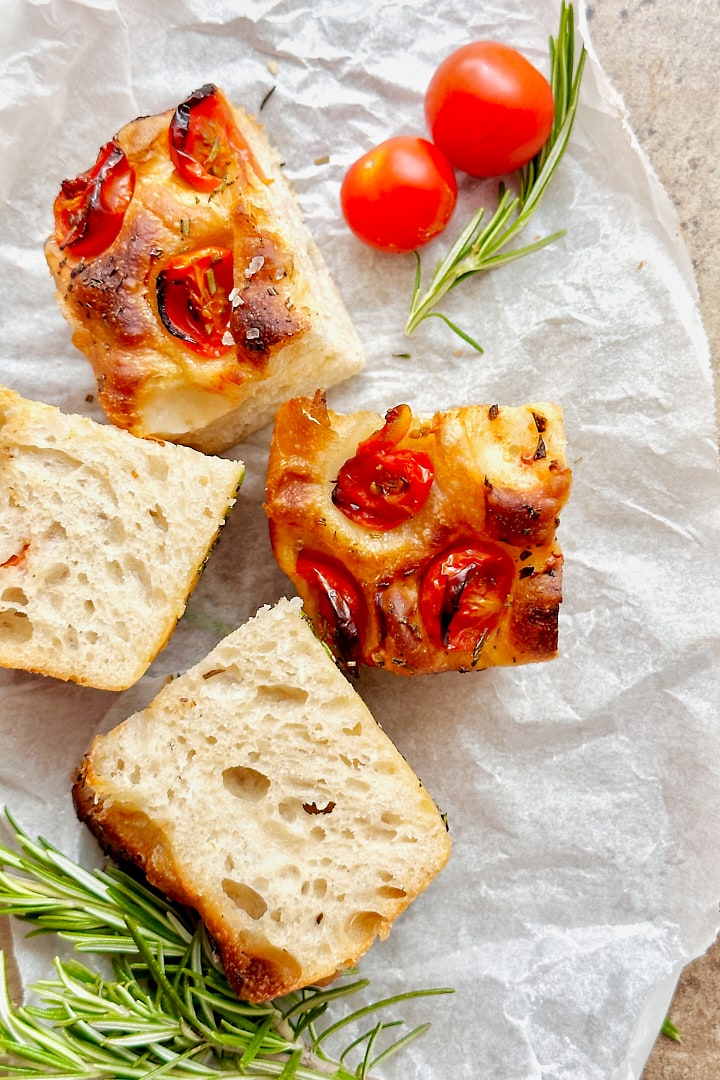
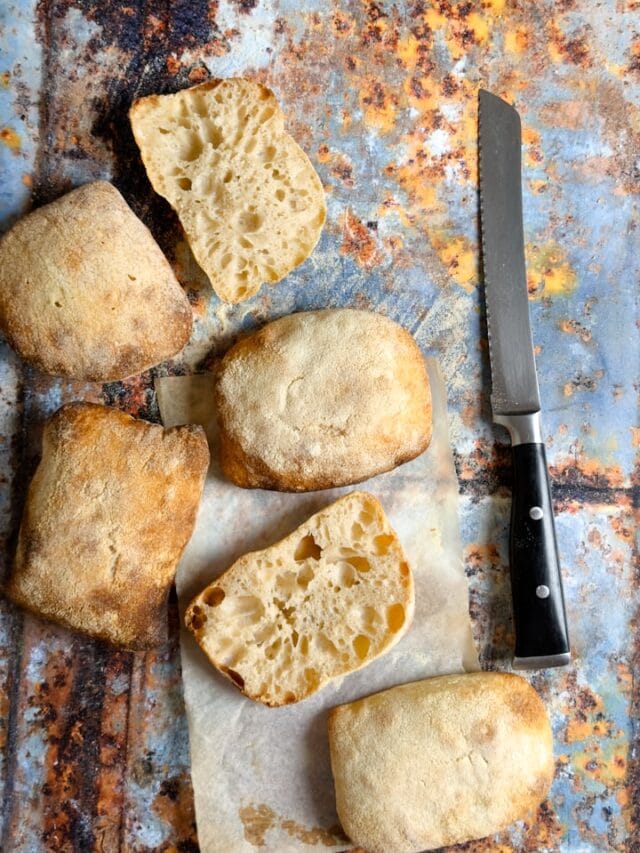
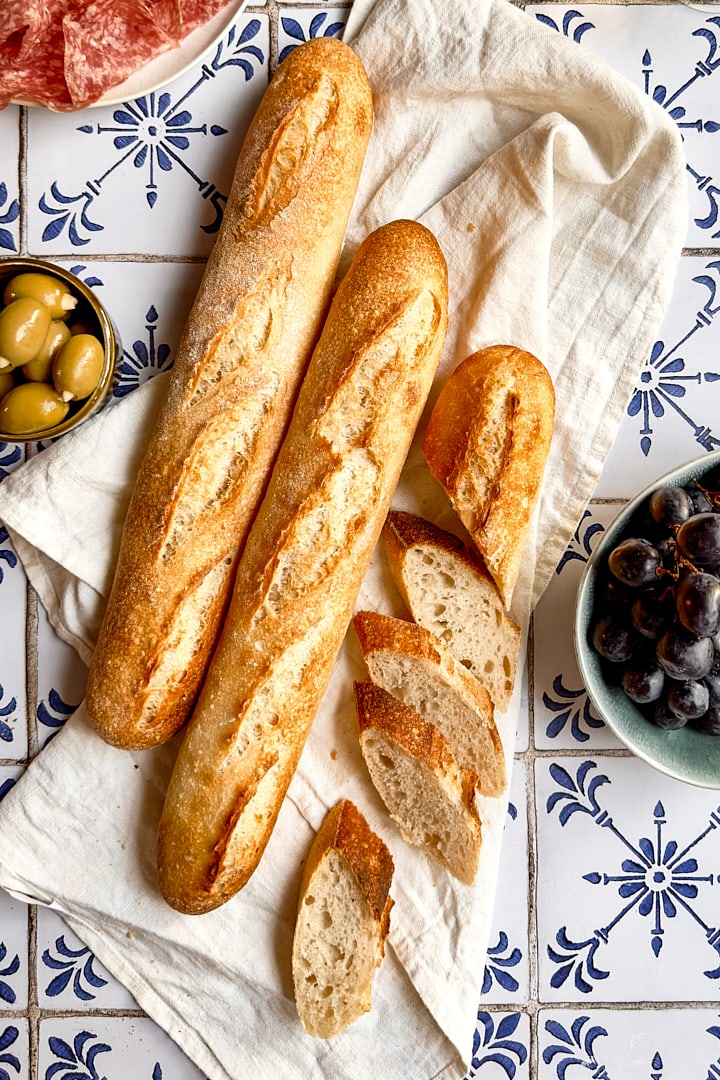
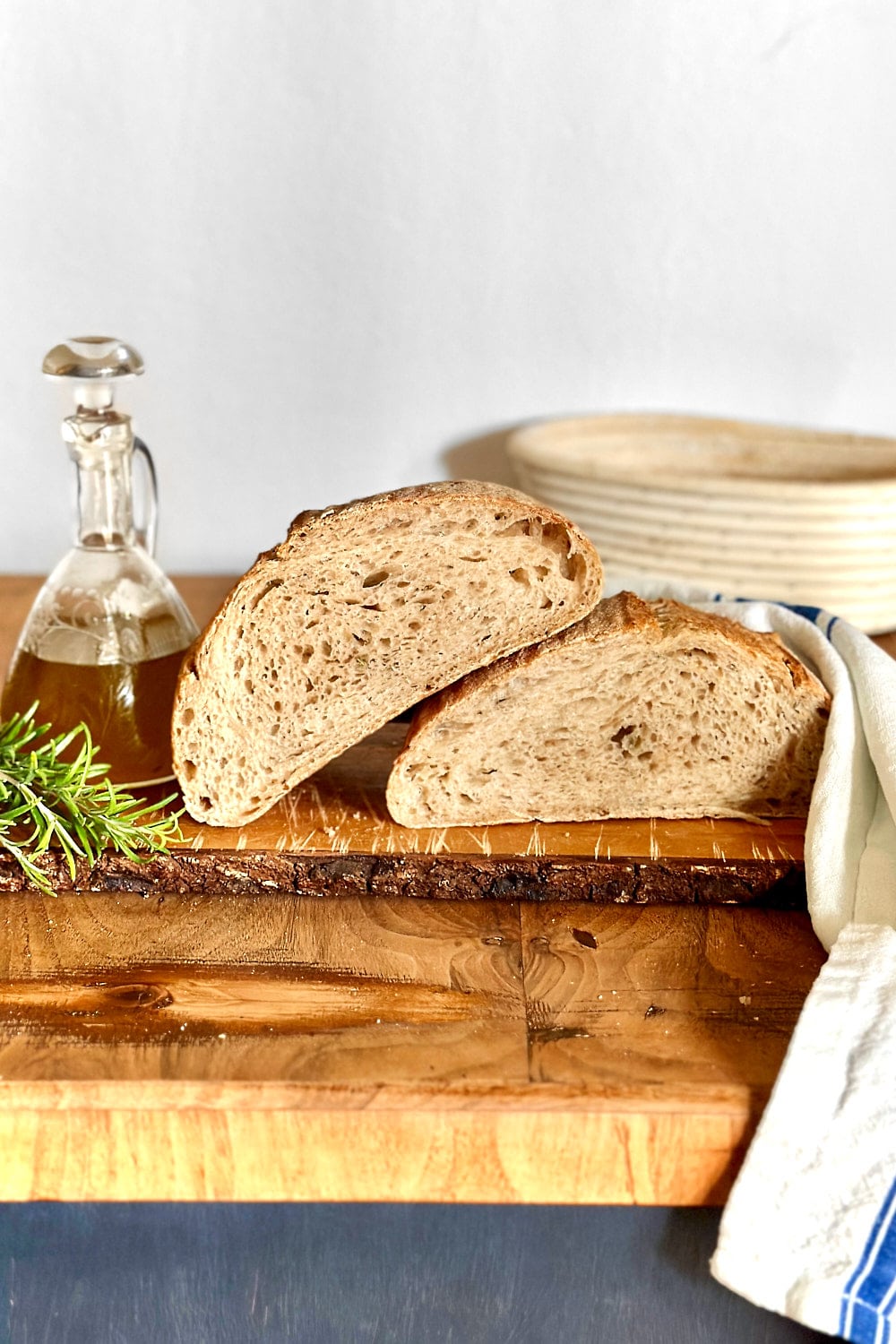
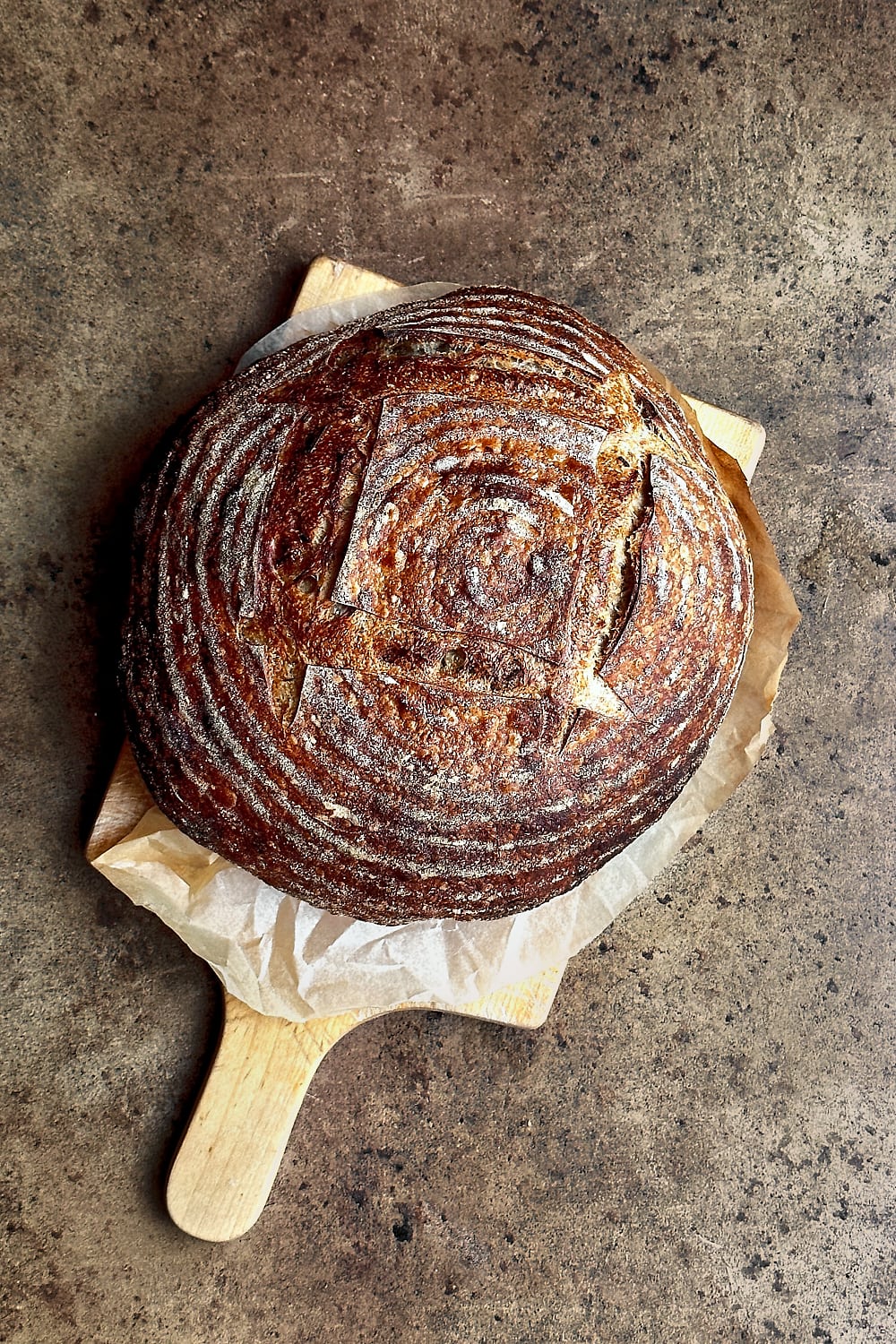
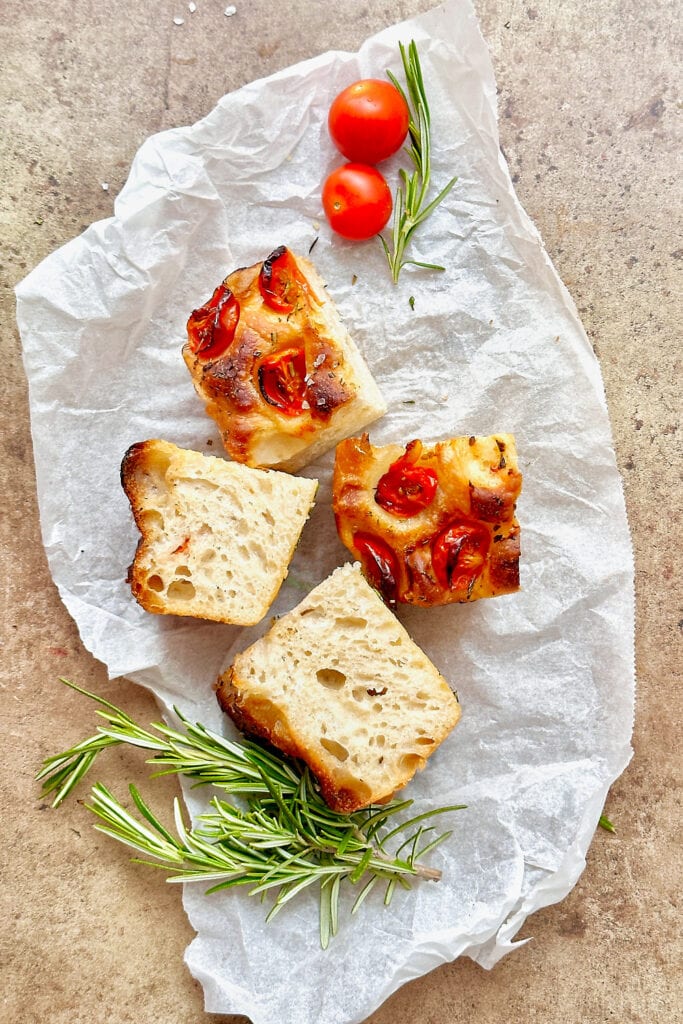
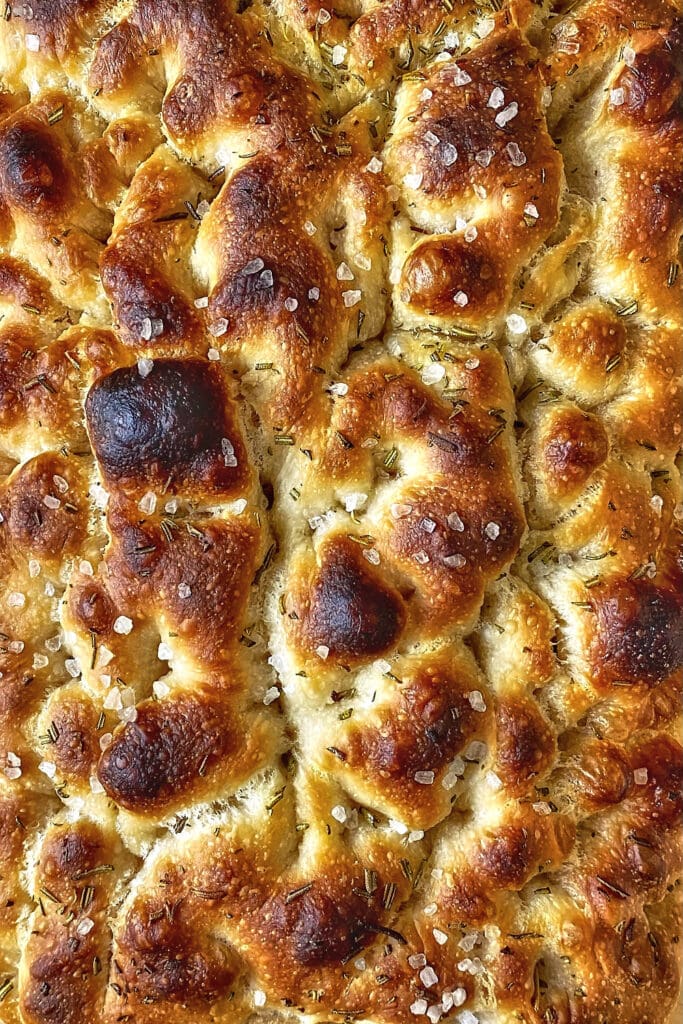
Can your naturally leavened (soudough starter) pizza dough be frozen? and I believe it can and if that is accorate at which step should it be frozen & how should it be handled when thawing? Thank you.
Hi Louise! To be honest, I’ve never tried freezing this pizza dough, so I can’t guarantee if it works. But if you want to experiment with it, you could try freezing the dough after shaping the dough balls. Then, let it thaw overnight in the fridge. The next morning, take it out of the fridge and let it proof in a warm spot until the dough has doubled in size and looks airy. Let me know if you have any other questions!